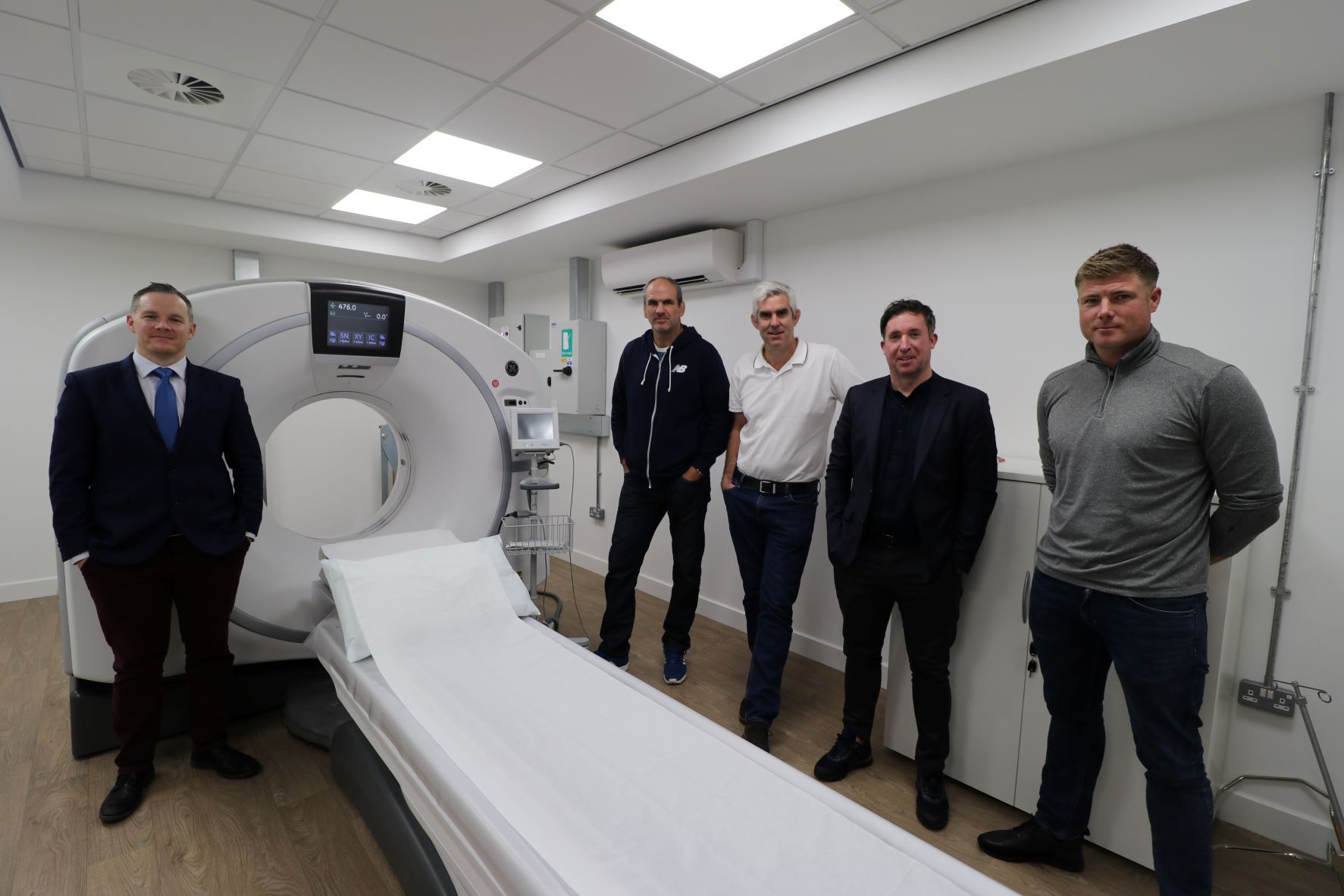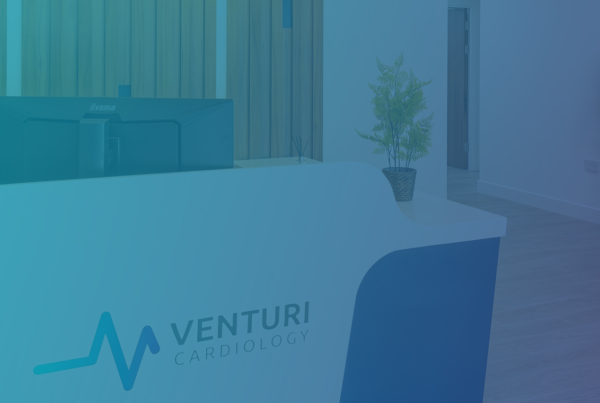Sporting legends Martin Johnson and Robbie Fowler today underwent cutting edge heart screening tests to raise awareness of World Heart Day 2021.
They were joined by former sports stars, professional footballer Neil Mellor and former professional rugby player Peter Scrivener, who were also screened.
They all attended Venturi Cardiology, the North West’s first independent healthy heart clinic for their calcium score heart tests carried out by two of the clinic’s preventative cardiology experts and founders, Dr Scott Murray and Dr Thomas Heseltine.
Venturi Cardiology in Warrington is on a mission to make world-class heart care accessible, affordable and more personalised.
As well as providing routine diagnostic cardiology services, Venturi’s primary objective is to treat the cause of heart disease, currently the UK’s biggest killer.
Every 25 minutes someone in the Northwest dies from heart or circulatory disease, with healthcare costs relating to these diseases estimated at £9 billion each year.
Coronary heart disease is the most common cause of heart attack and was the single biggest killer of both and men and women worldwide in 2019.
The aim of World Heart Day 2021, which took place on September 29th, is to improve awareness, prevention and management of cardiovascular disease globally.
During their visit, the sporting heroes, who all called for greater awareness of heart health, had a calcium score test to assess the likelihood of them having coronary heart disease. The test takes approximately 15 minutes, is non-invasive and pain free.
Martin Johnson, regarded as one of England’s greatest rugby players, said:
“I’m in my fifties so I’m in the male heart attack age risk category and it was great to come into Venturi Cardiology to get the heads up on how I am doing. The procedure was incredibly straightforward, simple and very easy to do.
“Taking care of yourself, and knowing how healthy your heart is, is massively important.
“That knowledge could help you prevent major issues in the future and possibly save your life – it’s that simple.”
Former professional footballer Robbie Fowler said:
“As an elite footballer it was easy to take my health for granted, but when you finish you’re not as fit and healthy as you once were.
“I’ve got a young family and I want to spend as much time as possible with them. There’s a history of heart attacks in our family and it’s a wrecker that spoils lives.
“I’ve been on the end of that which is why it is so important to come to a place like Venturi Cardiology and get checked out. It only takes 20 minutes from start to finish and the peace of mind it gives you is brilliant.”
Dr Scott Murray, who was inspired to become a cardiologist after his grandfather died suddenly of a heart attack, said:
“Heart disease is a constant pandemic, it has never gone away despite our endless list of new “wonder drugs”.
“The only way to change the current sick care, sudden symptom paradigm is to awaken individuals to the power of prevention.
“Small lifestyle changes can make a huge difference to someone’s risk profile. Getting the message out early – encouraging people to quit smoking, eat better, exercise more and to get tested when necessary, can and does save lives.
“On World Heart Day we gave cutting edge heart screening and bespoke risk scores to some of our most famous and diverse sports celebrities.
“If, through this awareness event, we can go on to find one dad, grandad or mum who is at very high risk for a devastating event and change their life course, then this will have been very worthwhile.”
Dr Jonathan Hasleton, one of the other founders and consultant cardiologists said: “We set up Venturi Cardiology because we recognised that patients were not getting access to timely diagnostics and that that the pathway to care was too long. We were seeing patients after they had a problem when we may have been able to address that problem in advance.
“Today, on World Heart Day, we want to people to know that heart disease can be preventable – prevention is key and that there is help out there. You are not alone.
It was Christiaan Barnard who said that he had ‘saved the lives of 150 people by heart transplants’ but if he ‘had focused on preventative medicine earlier might have saved 150 million’. Fifty years after the first heart transplant this maxim remains as true.
“If you have any concerns don’t bury your head in the sand, accept that you may need help and seek out that help. Speak to your GP and ask them to refer you to your nearest cardiology department if you have any concerns. Or if you would prefer, come and see us here in our bespoke clinic.”
Neil Lewis, Trustee of The Adam Lewis Foundation, which has partnered with Venturi Cardiology, said: “It’s fantastic for Warrington and the surrounding areas to have more options available when it comes to heart health.
“At The Adam Lewis Effect Foundation, we are acutely aware of the fact that many heart conditions are asymptomatic and can even lead to sudden adult death. But with knowledge of an underlying or asymptomatic heart condition, treatment can be sought and people can make a full recovery.
“Clinics like Venturi are putting knowledge and control around personal heart health more in reach.”
About the Calcium Score Test
A coronary CT calcium score measures the amount of calcified, or hardened, plaque in the heart arteries. This is usually explained as a calcium score, a surrogate measure of the total amount of plaque in the heart arteries. The greater amount of plaque you have, the higher the risk of heart attacks. Unlike a CT coronary angiogram, a calcium score doesn’t involve a dye injection.
The test takes approximately 15 minutes to perform and can see if a that a person has coronary heart disease.
A low score is useful because it shows that you are unlikely to have significant coronary heart disease.
A higher score means that you have coronary heart disease. If this is the case, you may go on to have a CT coronary angiogram or in some cases, if the doctor thinks it is more appropriate, you may have a coronary angiogram.
CT calcium scoring is sometimes used in patients without any symptoms related to their heart, to better understand their risk of having a heart attack and whether they need to make lifestyle changes or take preventive medicines such as aspirin and statins to lower their risk of having heart problems. Usually, these decisions are made by assessing patients’ risk factors. Sometimes this can be tricky, and a CT calcium score can help improve the risk estimates.
Patients, over the age of 45, without any symptoms of chest pain and a zero calcium have an extremely low risk of having a future heart attack. They may therefore not need to take preventive tablets such as aspirin or statins.
Patients with no symptoms but a high calcium score are at higher risk of heart attacks in the future and so may benefit from these preventive medications and a change in lifestyle. Currently this test is mainly used in private practices as a screening test. It is offered to VIPs such as Presidents of the USA and Astronauts, so why not you?
Sometimes CT calcium scoring can be used in other conditions such as heart valve disease to assess how severe the valve disease is.
If you want to “know your score” book today!












